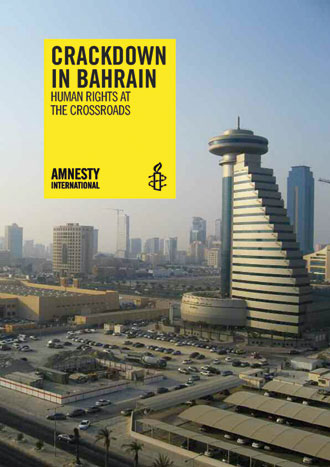
|
 |
 |
|
|
|
|
|
|
|
|
|
|
|
|
|
|
|
|
|
|
|
|
|
|
Amnesty International:
|
 |
The report pointed to the creation of more than 500 NGOs in Bahrain over the past decade working on a wide range of human rights issues including children’s and women’s rights, rights of migrant workers and trafficking in persons. The report pointed out that a few of such NGOs work on monitoring and documenting human rights violations. The report added that two of these organizations, namely the Bahrain Center for Human Rights and the Bahrain Youth Society for Human Rights had been banned in 2004 for violating Law No. 21 of 1989, which regulates the activities of NGOs. The report continued that despite the ban, the Centre and the Youth Society continue, through the Internet, to publish reports on various human rights issues and violations, especially violations by the security forces.
Amnesty International report stated that NGOs continued to face severe restrictions under the Law No. 21 of 1989, which prevents them from engaging in political activity. The law allows the Ministry of Social Development to intervene in internal affairs and activities of NGOs, access their files, suspend their executive offices, and withdraw their licenses. NGOs must obtain permission from the Ministry of Social Development in order to be able to obtain funding from outside the country, and must declare the purpose of funding. They must also get permission to organize local and international meetings, training seminars, or workshops on human rights issues.
The recommendations of the report were comprehensive and in line with the findings of Amnesty International delegation, which visited Bahrain in October 2010. The report urged the Bahraini government to take a number of immediate steps to address alleged human rights violations, and prevent the committing of more of them. The report also called upon the Bahraini authorities to carry out prompt, thorough and independent investigations into all cases of allegations of torture, publicly condemn the practices of torture, and declare unequivocally that Bahrain will not tolerate such violations.
The report also noted the need to establish effective judicial mechanisms to ensure the right to fair trial, in practice, including the right of the accused to be tried before an independent and impartial tribunal, the right to have defence counsel of one’s choice at all stages of the proceedings, and the right to be presumed innocent until proven guilty according to law.
In the area of freedom of expression, the report urged the Bahraini authorities to respect and protect the right to freedom of expression, including media freedom, in line with Bahrain’s obligations under international law. The report called upon the Bahraini authorities to respect and protect the right to freedom of movement and freedom of assembly and association, and to guarantee that all human rights organizations, as well as human rights defenders are able to carry out their work without interference or hindrance.
On the other hand, the report called upon the Government of Bahrain, with the participation of civil society organizations, to conduct a serious review of a number of Bahraini laws, in order to make them fully compatible with international humanitarian law and international human rights standards, and in order to meet Bahrain’s obligations to the Human Rights Council under the Universal Periodic Review mechanism.
Within the reforms process, the report pointed to the ratification by Bahrain of the main human rights treaties such as the Convention on the Elimination of All Forms of Discrimination against Women in 2002, the Optional Protocols to the Convention on the Rights of the Child in 2004, the International Covenant on Civil and Political Rights in 2006, and the International Covenant on Economic, Social and Cultural Rights in 2007. Bahrain has also become a party to the Arab Charter for Human Rights in 2006. Furthermore, the Bahraini government adopted new laws regarding the administration of justice and the formation of political associations. Bahrain has also established the Supreme Judicial Council in 2000 and the Supreme Constitutional Court in 2005.
In October 2010, Amnesty International sent a fact-finding delegation to Bahrain to research concerns associated with the August/September 2010 incidents, which resulted in arrests and ill-treatment of detainees. The report is based on the results of that visit. The report pointed to the meetings held by Amnesty International delegates with senior government officials including the Ministers of Interior, Justice, Islamic Affairs, Social Development, Foreign Affairs, Information, as well as the Public Prosecutor. The delegation also met with members of the National Foundation for Human Rights, several human rights organizations, civil society organizations, women and youth. The delegation monitored some of the trials held at the time of the visit.
The report stated that Amnesty International delegates had received assurances from the Bahraini officials they met affirming the Bahraini government’s commitments to human rights as well as addressing any allegations of human rights violations that Amnesty International brings to their attention. The report also noted the commitments made by Bahrain under the international conventions ratified by Bahrain including the International Covenant on Civil and Political Rights (ICCPR), the Convention against Torture and Other Cruel, Inhuman or Degrading Treatment or Punishment (CAT). Amnesty International said in this regard: (In ratifying these treaties, the Bahrain government promised both the people of Bahrain and the ... international community that it would uphold and respect their provisions. It must do so).